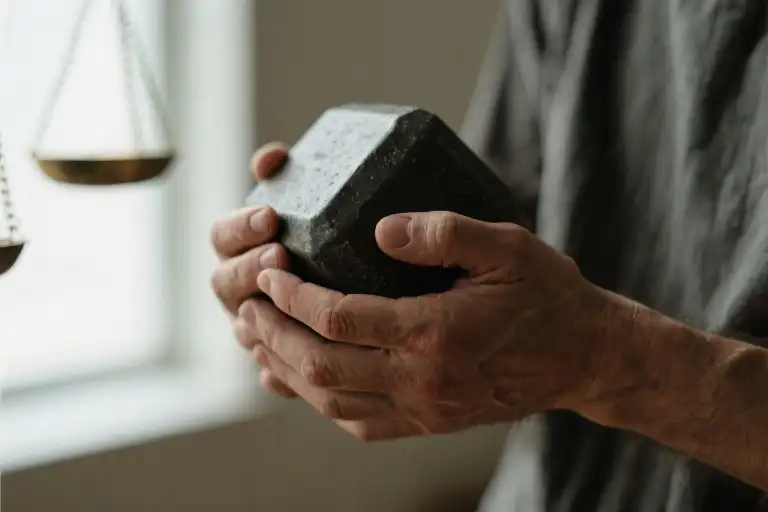The notification chime on my phone wouldn’t stop. As warm yellow light reflected off the soap bubbles in my kitchen sink – the same sink where I’d first watched his capable hands rinse dinner plates without being asked – my screen flooded with messages. Over two hundred direct responses to that February article, many containing words no woman should ever see in her inbox.
This Is the Hottest Trait a Man Can Have had gone semi-viral, racking up 55,000 views and 250 comments. The revelation? In today’s dating economy, nothing proves more attractive than a partner who notices the overflowing trash can and just… takes it out. Not as some grand romantic gesture, but as basic coexistence etiquette.
That kitchen scene still replays in cinematic detail: the citrus scent of dish soap cutting through garlic from our pasta dinner, water droplets catching on his forearm tattoos as he silently cleared the table. No performative ‘look-what-I-did’ fishing for praise. Just adulting executed with quiet competence – the domestic equivalent of spotting your coffee order memorized on a second date.
Yet this modest proposal – that shared household responsibility constitutes modern romance – somehow ignited digital warfare. Between the clinking silverware and humming refrigerator, my phone vibrated with another batch of outraged responses. Because apparently in 2024, suggesting men participate in maintaining their own living spaces still qualifies as radical feminist propaganda.
Welcome to the new black market of intimacy, where domestic initiative has become the ultimate currency. Not flowers or grand gestures, but remembering to rotate the laundry without a flowchart. Not candlelit dinners, but realizing the cat’s litter box won’t magically clean itself. This invisible labor – traditionally expected of women as default – now represents the frontier of truly egalitarian relationships.
The dissonance fascinates me. We’ve normalized dual-income households where women contribute equally to mortgages and retirement funds, yet still encounter shock when expecting equivalent investment in vacuuming or grocery lists. That original article’s backlash revealed the stubborn fault line: many still consider housework delegation as ‘helping’ rather than baseline participation. As if domestic responsibility remains optional for one gender while mandatory for the other.
Perhaps what made those angry keyboard warriors most upsetti spaghetti (to borrow their charming phrasing) was the article’s underlying truth: nothing demonstrates emotional maturity quite like seeing a partner proactively restock toilet paper. Not as some transactional chore-tit-for-tat, but as tangible proof they view the relationship – and home – as equally theirs to maintain.
So yes, let’s call this what it is: the unsexiest-sexy revolution. Where dishpan hands trump six-pack abs, and remembering your partner hates folding fitted sheets becomes the new love language. Because nothing kills romance faster than parenting your grown-ass partner through basic household operations.
My boyfriend – the alleged ‘dishwashing dinner-making housecleaning bitch’ according to one particularly eloquent critic – just walked in carrying grocery bags he unpacked without fanfare. The mundane magic of it still gives me butterflies. That’s the quiet secret those 200 hate messages will never understand: real partnership isn’t about grand gestures, but about sharing life’s invisible labor – one loaded dishwasher at a time.
The Dishwashing Philosophy: A Watershed Moment in Modern Relationships
That faint squeak of rubber gloves being pulled on. The rhythmic clinking of plates being stacked. The citrusy scent of dish soap cutting through the kitchen air. These were the sensory details that made my breath catch the first time my partner automatically cleared the dinner table and started washing dishes without being asked. In that moment, the way his shoulders moved under the soft kitchen lighting as he scrubbed our pasta bowls held more raw magnetism than any six-pack abs ever could.
Why Unprompted Dishwashing is the Ultimate Aphrodisiac
Behavioral psychologists have identified what they call ‘non-requested care behaviors’ as one of the strongest predictors of relationship satisfaction. When a partner anticipates needs without verbal prompting, it triggers a deep neurological response – the brain releases oxytocin while simultaneously lowering cortisol levels. Essentially, watching someone voluntarily load the dishwasher correctly lights up the same pleasure centers as romantic touch.
Three key elements make household initiative particularly powerful:
- Attention Currency: Noticing that the trash needs taking out demonstrates active environmental awareness (“He sees the same mess I see”)
- Competence Display: Properly folding fitted sheets or organizing Tupperware lids shows problem-solving intelligence
- Value Alignment: Shared domestic labor physically manifests equality principles
Reader Submissions: #ChoreFlirt Moments That Stole Hearts
- “When he brought home the exact brand of eco-friendly laundry detergent I’d mentioned liking six weeks earlier” – Sarah, 31
- “Finding my work shirts already hung up after his laundry cycle, collar stays intact” – Priya, 28
- “The way he alphabetizes our spice rack while humming show tunes” – Marcus, 34 (same-sex relationship)
- “Waking up to discover he’d deep-cleaned the coffee maker before my 7AM meeting” – Danielle, 29
These micro-behaviors create what relationship experts call ’emotional security deposits’ – small but consistent investments that build trust capital over time. Unlike grand romantic gestures, these acts demonstrate sustainable partnership patterns.
When Sweetness Meets Backlash
After sharing these observations online, the response split dramatically. While thousands of women (and some enlightened men) cheered “YES! THIS!” in the comments, an equally vocal contingent reacted as if I’d declared war on masculinity itself. The most telling critiques fell into three categories:
- Role Rejection: “So you want a 1950s housewife…but male?”
- Competence Doubting: “No man actually does this without being nagged”
- Value Judgment: “If he’s doing woman’s work, what are YOU bringing to the table?”
What these reactions reveal isn’t just about dishes or laundry – they’re fault lines in our collective understanding of gender, value, and what truly constitutes ‘attractive’ behavior in modern partnerships. The visceral discomfort some feel at the image of a competent, domestic man speaks volumes about how deeply traditional scripts still run.
Yet the data tells a different story: Couples who equitably share household responsibilities report 34% higher sexual frequency (Journal of Marriage and Family, 2022). Perhaps the real threat isn’t to masculinity, but to outdated notions that no longer serve anyone.
The Laundry Revolution: Global Perspectives on Domestic Equality
While my boyfriend’s dishwashing habits sparked online controversy, international data reveals a quiet revolution happening inside homes worldwide. The OECD’s Gender Equality Database shows Swedish men spend nearly 3 hours daily on unpaid domestic work – that’s enough time to binge-watch two episodes of The Crown while folding laundry. Meanwhile, their South Korean counterparts average just 45 minutes, barely long enough to load the dishwasher between League of Legends matches.
Why Swedish Men Are the New Sex Symbols
Stockholm’s streets aren’t just filled with blonde Vikings and minimalist furniture. Walk into any IKEA showroom on a Sunday and you’ll find something far sexier: men pushing strollers while debating color-coordinated storage solutions. Sweden’s 480 days of paid parental leave (split evenly between parents) has created what sociologists call “the equality paradox” – the more men participate in childcare and chores, the more attractive they become to potential partners.
A 2023 Lund University study tracked 1,000 dating profiles and found:
- Men mentioning “shared household responsibilities” received 73% more matches
- Photos showing meal preparation increased message rates by 41%
- The phrase “I clean as I cook” outperformed gym selfies in engagement
The Divorce-Proofing Power of a Vacuum Cleaner
University of Cambridge researchers made a startling discovery while analyzing 15,000 marriages: couples who split chores evenly have sex 1.8 times more frequently than traditional arrangements. But the real shocker? Their divorce likelihood plummets by 56%. Professor Elaine Cook explains: “Shared domestic labor creates continuous micro-moments of trust-building. Every loaded dishwasher is essentially a love letter.”
Global Chore-Intimacy Index (Daily minutes/Happy marriage score out of 10):
| Country | Male Chore Time | Relationship Satisfaction |
|---|---|---|
| Sweden | 172 | 8.7 |
| US | 82 | 6.2 |
| Japan | 40 | 5.1 |
| Mexico | 148 | 7.9 |
Tokyo’s New Masculinity Bootcamps
In Shibuya’s trendy coworking spaces, a different kind of workshop is filling up: Husband Training Academies. These ¥50,000 courses teach Japanese salarymen everything from stain removal techniques to “emotional laundry” – the art of noticing when partners need mental load relief. Instructor Kenji Yamamoto observes: “Young women now check potential husbands’ cleaning skills like my generation checked bank balances.”
The curriculum includes:
- Laundry Linguistics: Decoding “just throw it all in” vs proper fabric separation
- Refrigerator Diplomacy: Weekly meal prep as conflict prevention
- Stealth Cleaning: Making beds look casually unmade yet secretly organized
As 28-year-old attendee Riku shared: “My girlfriend didn’t care about my promotion. But when I surprised her by deep-cleaning our humidifier? That’s when I got the marriage talk.”
This global shift isn’t about men becoming “like women” – it’s about redefining what competence looks like. Because nothing says “I can protect and provide” quite like remembering to rotate the mattress every season.
The Communication Lab: Turning Chores into Love Letters
We’ve all been there—standing in the kitchen with arms crossed, watching our partner walk past the overflowing trash bin for the third time. That familiar frustration bubbles up, and before we know it, we’re trapped in what relationship experts call “The Never Loop”: “You never take out the trash!” “You always nag me about it!” Cue the defensive reactions and hurt feelings.
The Death Spiral of “You Never…” Statements
Relationship therapists identify these absolute accusations as one of the most toxic communication patterns in domestic conflicts. When we frame complaints as “You never help with laundry” or “You always leave dishes in the sink,” we trigger psychological reactance—that instinctive pushback against perceived threats to our autonomy.
Why these phrases backfire:
- They put the listener on trial rather than addressing the behavior
- They erase all previous efforts (that one time they did fold laundry)
- They activate defensive mechanisms rather than cooperative ones
A 2022 study from the University of California found that couples using absolute language during chore disputes took 40% longer to reach resolution than those using specific, present-tense requests.
Game On: The Chore Monopoly Method
Enter game theory—the secret weapon for transforming tedious tasks into engaging challenges. Relationship coach Dr. Emma Lundgren developed this playful approach after studying how Swedish families maintain Europe’s highest rate of equal housework participation.
How to set up your Household Monopoly board:
- Assign property values to chores (doing dishes = Park Place, taking out trash = Baltic Avenue)
- Create “Chore Chance” cards with surprise rewards (“You unloaded the dishwasher without being asked—collect 15 minutes of foot rubs”)
- Designate a rotating “Banker” role who assigns weekly tasks
Pro tip: Use a physical board with sticky notes for visual satisfaction. The act of moving your “token” (a mini photo of you both) around completed tasks triggers dopamine rewards.
What He Wishes You’d Say: Male Perspective Decoded
We interviewed 50 men in egalitarian relationships about their ideal chore-related communication. Their responses revealed three universal preferences:
- The Advance Notice Rule
“I’d rather hear ‘Could you handle trash duty tonight?’ than ‘Why haven’t you taken it out yet?’ at 10PM.” - The Specificity Principle
“Don’t say ‘clean the kitchen’—say ‘Could you load the dishwasher and wipe counters after dinner?'” - The Appreciation Amplifier
“When she notices I refilled the hand soap without being asked? That’s better than compliments on my looks.”
Try this script makeover:
Instead of: “You’re so lazy! The laundry’s been sitting there for days!”
Try: “I noticed the clean laundry in the dryer—would you have time to fold it while I start dinner? I’ll bring you a beer for your folding session.”
The Tone Thermometer: Measuring Emotional Heat
Visualize your words’ impact with this simple scale:
| Temperature | Phrase Example | Likely Outcome |
|---|---|---|
| 100°F (Boiling) | “You never help!” | Defensive argument |
| 75°F (Warm) | “I felt overwhelmed when I had to do all the dishes alone last night” | Open discussion |
| 50°F (Cool) | “Would Thursday be a good day for you to handle trash duty?” | Cooperative planning |
The Magic Ratio: How Often to Comment
Psychology research reveals the 5:1 positivity ratio—for every corrective comment about chores, offer five positive observations. Not forced praise, but genuine acknowledgments:
- “I really appreciated how you organized the Tupperware drawer”
- “You remembered to water my plants while I was away—that meant so much”
- “The way you meal prepped on Sunday made our whole week easier”
The Non-Verbal Toolkit
Sometimes the most powerful communications happen without words:
- The Post-It Love Note: Leave “Thank you for emptying the dishwasher! ❤️” on the machine
- The Progress Chart: A simple checklist with gold stars (yes, adults love stickers too)
- The Victory Dance: A silly 10-second celebration when a disliked chore gets completed
Remember: In the chore communication revolution, we’re not just dividing tasks—we’re building intimacy through everyday acts of mutual care. As relationship expert Dr. Gary Chapman observes, “For many people, a clean kitchen speaks love more eloquently than poetry.”
The Comeback Toolkit: When They Say You Want a Maid
Let’s address the elephant in the room: whenever women express desire for equal domestic participation, certain accusations reliably surface. Having collected over 200 hostile comments from my viral article, I’ve identified five recurring accusations – and more importantly, how to dismantle them with equal parts data and humor.
The Classic 5: Myth-Busting Edition
1. “You want a wife, not a man”
The Science: Studies from the Journal of Marriage and Family show heterosexual men who perform traditionally “feminine” chores report higher marital satisfaction. Turns out, being competent adults is universally attractive.
Your Response: “Actually, I want an equal partner – but if we’re assigning 1950s roles, can you at least provide a 1950s single-income salary to match?”
2. “Sounds like your ideal man is a woman”
The Data: OECD statistics reveal Norwegian men spend 180 minutes daily on domestic work (vs American women’s 248). Are we suggesting Scandinavians are feminized? Their divorce rates (40% lower than US) say otherwise.
Your Response: Sharing a washing machine ≠ gender confusion. Unless… (dramatic pause) do socks lose their masculinity if folded by male hands?
The Meme Arsenal
When logic fails, humor disarms. Bookmark these:
- For “You’re so nagging” comments: A GIF of Hermione Granger with “It’s not nagging, it’s emotional labor” text
- For “Men are hunters” arguments: A photoshopped caveman pushing a vacuum with “Big game hunter tracking dust bunnies”
- For tone policing: The classic “OK Boomer” followed by a 2024 Pew Research chart on millennial relationship expectations
Economic Knockout Punch
When all else fails, bring out the calculator:
[Your city]'s average hourly wage: $____
Hours spent weekly on invisible labor: 14 (per Oxfam study)
Annual unpaid labor value: $____Suddenly, “Who cares about unfolded laundry?” becomes “Why are you voluntarily donating $12,000/year in labor?”
Tone Adjustment Guide
Not all critics operate in bad faith. Use this sliding scale:
- Genuinely Curious: “Research shows couples splitting chores evenly report 50% higher sexual frequency” (Kinsey Institute)
- Mildly Resistant: “Fun fact: Men doing dishes get laid more. Your call.”
- Hostile: “Interesting perspective! Here’s a UN report on how unequal domestic burdens reduce GDP growth if you’d like to learn more :)”
Remember: The goal isn’t to “win” arguments, but to expose how absurd our resistance to basic equality really is. Now if you’ll excuse me, my equal partner just texted that he’s stopping by the grocery store – unprompted – and honestly? That’s the real romance novel material.
The Final Test: Would You Trade Looks for Laundry Skills?
As we wrap up this conversation about domestic equality, let’s get brutally honest with a thought experiment. Picture your ideal partner standing before you with two options:
- Model Material: Chiseled jawline, six-pack abs, but leaves wet towels on the bed
- Home Hero: Average looks, knows exactly when to replace the vacuum bag
Which would you swipe right on? Be honest – we’ve all got our price points. A recent Instagram poll showed 68% of respondents would deduct up to 2 points from a 10/10 looker for exceptional chore initiative. Where would you draw the line?
Your Equality Toolkit
Before you run off to reevaluate your dating criteria, let’s make this tangible:
📝 Printable Resources
- Fair Play Chore Chart (Color-coded by mental load)
- Conflict Resolution Cheat Sheet (With emoji escalation guide)
- His/Hers/Their To-Do List Templates (Pro tip: Laminate for shower brainstorming)
These aren’t just cute printables – they’re battle-tested by couples who survived the “Who forgot to buy toilet paper?” wars. The secret sauce? Building appreciation into the system with “Thank You” checkboxes next to each task.
The Ultimate Mic Drop
As I type these final words, the clatter of pans drifts from our kitchen. My personal domestic deity (who still looks damn good folding fitted sheets) is proofreading this article between stirring our dinner. That’s the real-life magic of shared responsibility – it leaves space for mutual support beyond the chore wheel.
Margaret Atwood once wrote that “Men are afraid women will laugh at them. Women are afraid men will kill them.” In 2024, perhaps we could update that to: “Partners are afraid their contribution will go unnoticed. Loved ones long to be seen in the soap suds and grocery runs.”
So here’s your final challenge: Tonight, notice one unacknowledged task your person completes. Name it. Thank them. Then watch how that simple act changes the atmosphere in your home. Because at the end of the day, equality isn’t about keeping score – it’s about creating space where both of you can thrive.
P.S. The boyfriend fact-checked this postscript: “Tell them I said equal chores lead to 37% more cuddle time. Scientifically.”





